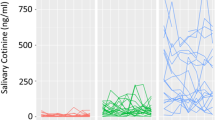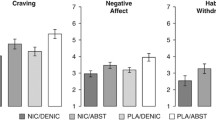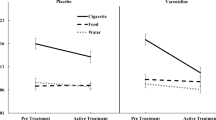Abstract
Twenty-nine cigarette smokers completed a smoking motivation questionnaire and had expired-air carbon monoxide (CO) and plasma nicotine concentrations measured prior to abstaining from smoking for 24 h. Before and after the abstinence period, the subjects rated mood and physical symptoms known to be affected by cigarette abstinence (e.g. irritability, restlessness). Scores on the “dependent smoking” subscale of the smoking motivation questionnaire correlated significantly with overall withdrawal severity, craving, and increased irritability. “Indulgent smoking” scores correlated positively with increased hunger. Pre-abstinence plasma nicotine concentration significantly pedicted craving, hunger, restlessness, inability to concentrate and overall withdrawal severity, while expired-air CO predicted craving and restlessness only. Usual daily cigarette consumption did not significantly predict any withdrawal effects. The data indicate that pre-abstinence measures of smoking motivation and smoke intake may provide a guide to withdrawal severity on smoking cessation and that smokers with a high pre-abstinence nicotine intake experience the greatest discomfort.
Similar content being viewed by others
References
Burns BH (1969) Chronic chest disease, presonality, and success in stopping cigarette smoking. Br J Prev Soc Med 23:23–27
Feyerabend C, Russell MAH (1979) Improved gas chromatographic method and micro-extraction technique for measurement of nicotine in biological fluids. J Pharmacol Pharm 31:73–76
Gritz ER, Jarvik ME (1973) Preliminary study: forty-eight hours of abstinence from smoking. Proceedings, 81 st Annual Convention, American Psychological Association, 1037–1040
Hughes JR, Hatsukami DK, Pickens RW, Krahn D, Malins S, Luknic A (1984) Effect of nicotine on the tobacco withdrawal syndrome. Psychopharmacology 83:82–87
Russell MAH, Peto J, Patel UA (1974) The classification of smoking by factorial structure of motives. JR Statist Soc Series (A), 137:313–346
Schneider NG, Jarvik ME, Forsythe AB (1984) Nicotine versus placebo gum int he alleviation of withdrawal during smoking cessation. Addict Behav 9:149–156
Shiffman SM (1979) The tobacco withdrawal syndrome. In: Krasnegor NA (ed) Cigarette smoking as a dependence process. NIDA Research Monograph 23, pp 158–184
West RJ, Jarvis MJ, Russell MAH, Carruthers ME, Feyerabend C (1984a) Effects of nicotine replacement on the cigarette withdrawal syndrome. Br J Addict 79:215–219
West RJ, Russell MAH, Jarvis MJ, Feyerabend C (1984b) Does switching to an ultra-low nicotine cigarette induce nicotine withdrawal effects? Psychopharmacology 84:120–123
Zeidenberg P, Jaffe JH, Kanzler M, Levitt MD, Langone JJ, Van Vunakis H (1977) Nicotine: continine levels in blood during cessation of smoking. Comp Psychiatry 18:93–101
Author information
Authors and Affiliations
Rights and permissions
About this article
Cite this article
West, R.J., Russell, M.A.H. Pre-abstinence smoke intake and smoking motivation as predictors of severity of cigarette withdrawal symptoms. Psychopharmacology 87, 334–336 (1985). https://doi.org/10.1007/BF00432717
Received:
Accepted:
Issue Date:
DOI: https://doi.org/10.1007/BF00432717




